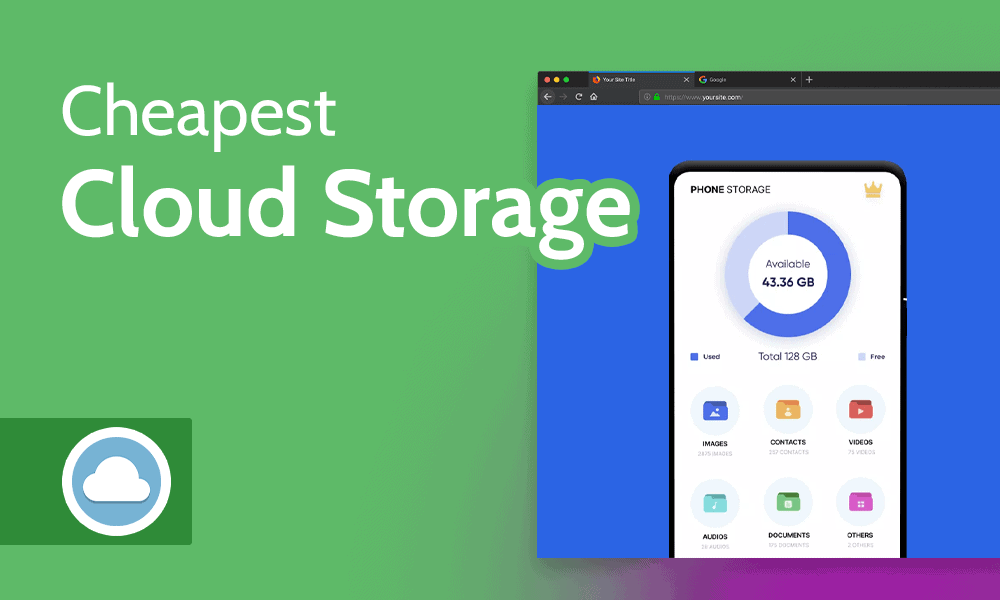In today’s digital age, cloud storage is essential for both personal and business use. Finding the least expensive cloud storage can save money while ensuring data is secure and accessible.
Cloud storage services offer a range of pricing models and features. It’s crucial to understand these options to choose the best value for your needs. This guide will help you explore the most budget-friendly cloud storage solutions available. We’ll dive into various pricing models, potential hidden fees, and the top providers that offer excellent services at low costs.
Whether for personal use or business requirements, this introduction will set the stage for finding the most affordable and efficient cloud storage options. Let’s embark on this journey to make smarter, cost-effective storage choices.

Credit: gizmodo.com
Table of Contents
Least Expensive Cloud Storage: Get The Best Value
Finding the best value in cloud storage can be a challenge. Many services promise low prices, but hidden fees often increase costs. To get the least expensive cloud storage, it is important to compare plans. Look for services that offer flexible options.
Some companies provide pay-as-you-go plans. This can help you avoid paying for storage you do not use. Also, check if they offer free trials. Trying a service before committing can save money. Don’t forget to read reviews. Other users’ experiences can guide you.
Lastly, ensure the service has good security. Storing data cheaply is only worth it if your data stays safe.
Understanding Cloud Storage Pricing Models
Cloud storage pricing models can be complex. Different providers offer various pricing plans. Some charge by the amount of storage space used. Others have a flat monthly fee. Pay-as-you-go models are also common. This means you only pay for what you use.
Free tiers may be available with limited storage space. Additional costs can arise for data transfers or extra features. Understanding these details can help you find the most affordable option. Comparing different providers is key. Look at their pricing structures carefully.
Consider your storage needs and budget. This way, you can choose the best plan for you.
Pay-as-you-go Vs. Fixed Plans
Selecting between pay-as-you-go and fixed plans for cloud storage can be tricky. Pay-as-you-go plans charge based on how much storage you use. This option is flexible. If you use less storage, you pay less. It is great for users with changing storage needs.
Fixed plans, on the other hand, offer a set amount of storage for a fixed price. This can be a good choice for users who know exactly how much storage they need. Fixed plans can help you budget better because the cost is always the same.
Both options have their benefits, and choosing the right one depends on your specific needs.
Storage Tiers And Their Cost Impact
Cloud storage services often come with different pricing options. These are called storage tiers. Each tier varies in cost depending on the service provided. Basic storage tiers usually offer less space and fewer features. They are the cheapest option. Mid-level tiers provide more storage and extra features.
They cost a bit more. High-end tiers come with the most storage and advanced features. These are the most expensive. Choosing the right tier depends on your needs and budget. For those with minimal storage needs, the basic tier is a good choice.
For more storage and features, consider the mid-level tier. High-end tiers suit users with large storage requirements and the need for advanced features.
Hidden Fees To Watch For
Many cloud storage services advertise low prices, but hidden fees can quickly add up. Storage plans often come with extra charges for exceeding data limits. Some providers may also bill for additional users or devices connected to the account. Data transfer fees can surprise users when moving large files.
Another common fee is for accessing data frequently, which can be costly for businesses needing constant data retrieval. It’s important to read the fine print in pricing plans to avoid unexpected costs. Understanding these hidden fees can help in choosing the most affordable cloud storage service without breaking the budget.
Top Budget-friendly Cloud Storage Providers Today
For those on a budget, finding affordable cloud storage can be challenging. Google Drive offers a generous 15GB of free storage. This is a great starting point for many users. Another good option is Dropbox, which provides 2GB of free storage with easy sharing options.
For those needing more space, pCloud offers a lifetime plan, saving money in the long run. It gives 10GB of free storage initially. Microsoft OneDrive is another strong contender, offering 5GB for free and seamless integration with Office apps. Each of these providers balances cost and features, making cloud storage accessible without breaking the bank.
Finding The Least Expensive Cloud Storage Options
Finding affordable cloud storage options can help save money without sacrificing quality. Many services offer competitive pricing for storing files securely online. Google Drive provides a free plan with 15 GB of space, suitable for basic needs. Upgrading to 100 GB costs just a few dollars per month.
Microsoft OneDrive offers 5 GB free, with 100 GB plans available at a reasonable price. Dropbox gives users 2 GB for free, with affordable options for more space. Other services like pCloud and iDrive also have budget-friendly plans. Comparing these options helps find the best fit for your storage needs.
Personal Storage Solutions
Finding the right personal storage solution at a low cost can be a challenge. Many people need a place to store photos, documents, and other files. Cloud storage provides an affordable and convenient option. Services like Google Drive, Dropbox, and OneDrive offer free plans with limited storage.
These plans are perfect for individuals with small storage needs. Upgrading to a paid plan is an option if more space is required. Prices are generally low, making it easy to fit into a budget. The flexibility of accessing files from any device adds to the appeal.
Staying organized and keeping important data safe has never been easier.
Business Storage Solutions
Selecting the right storage solution for your business can be challenging. Many businesses need storage options that are cost-effective yet reliable. Cloud storage offers a viable solution for many companies. It provides flexibility and scalability without the need for physical hardware.
Companies can save money by only paying for the storage they actually use. This is beneficial for businesses with fluctuating storage needs. Security is also a key feature, with many providers offering robust protection measures. Automatic backups ensure data is safe and can be easily restored if needed.
Overall, cloud storage presents a practical and affordable option for businesses seeking efficient storage solutions.
Hybrid Storage Options
Hybrid storage options blend the advantages of both local and cloud storage. This approach allows users to store frequently accessed files on local servers, ensuring quick access. Less critical data can be stored in the cloud, saving costs and space.
For businesses with fluctuating storage needs, hybrid storage offers flexibility. It can easily scale up or down based on current demands. Also, hybrid solutions provide an extra layer of security. Sensitive data can remain on-premises while other data is safely stored off-site.
This combination helps in achieving a balance between cost-efficiency and performance.
Comparing Storage Capacities And Their Costs
Different cloud storage providers offer varying storage capacities and costs. Some services provide small amounts of free storage, while others charge for every gigabyte used. Choosing the right plan depends on your needs. For example, Google Drive offers 15GB for free, which suits many casual users.
On the other hand, Amazon S3 charges based on storage size and data transfer, making it ideal for larger needs. Dropbox offers flexible plans, starting with 2GB free and paid plans for more space. Microsoft OneDrive gives 5GB for free, with options to upgrade.
Each provider has its own pricing structure, so comparing them is key to finding the least expensive option that meets your storage requirements.
Essential Features That Add Value Without Cost
Many people seek affordable cloud storage options that still offer essential features. Storage solutions should include ample space for files and easy access from any device. Security is another important aspect, ensuring data remains safe and private. User-friendly interfaces help individuals manage their files without needing technical expertise.
Compatibility with various file types ensures that users can store documents, photos, and videos without issues. Reliable customer support is also a key feature, providing assistance whenever needed. These elements make a cloud storage service valuable without adding extra costs.
File Sharing Capabilities
Affordable cloud storage options often come with robust file sharing capabilities. Users can easily share large files with friends, family, or colleagues. These services usually include features like link sharing, which allows you to send a file to someone without them needing an account.
Some platforms even offer password protection for added security. Access permissions can be customized, letting you decide who can view, edit, or download the files. These functionalities make collaboration straightforward and efficient. Most services also support multiple file types, ensuring compatibility with various formats.
Overall, the convenience of sharing files without high costs makes these cloud storage solutions appealing.
Collaboration Tools
Cloud storage offers many tools for working together. Teams can edit documents at the same time. This means less email and faster work. Changes are saved automatically. Everyone sees the latest version. Some tools let you chat while you work.
This helps solve problems quickly. You can also share files with a link. No need to worry about file size. Cloud storage keeps your files safe. Access them from anywhere, anytime. It makes teamwork simple and smooth.
Mobile Access Options
Accessing cloud storage on mobile devices offers great convenience. It’s possible to view and share files no matter where you are. Many cloud storage services provide user-friendly apps for iOS and Android. These apps allow users to upload, download, and sync files easily.
Notifications help keep you updated on any changes to your documents. Security features ensure your data remains safe, even when using a public network. Some services also offer offline access, enabling you to work without an internet connection. Overall, mobile access to cloud storage makes file management simple and efficient.
Security Measures In Budget Cloud Storage
Security is a major concern in budget cloud storage. Affordable services often use encryption to protect data. This means your files are coded so only you can read them. They also use strong passwords and two-factor authentication. This adds an extra layer of security.
Some services have regular security updates. This helps keep your data safe from new threats. Many budget options have data backup features. In case of a problem, you can restore your files. Even on a budget, cloud storage can offer good security.
Just make sure to choose a reliable provider. This way, your data stays safe without spending too much.
How To Maximize Storage Space On A Budget
Finding the best value in cloud storage can be tricky, but it’s possible to maximize storage space on a budget. Start by exploring free storage options from popular providers like Google Drive, Dropbox, and OneDrive. Many offer a few gigabytes of space at no cost.
Also, consider using multiple accounts to increase your storage capacity without paying extra. Compressing files can save space, allowing you to store more data. Deleting unnecessary files and regularly organizing your storage can make a big difference. Finally, keep an eye out for promotions and discounts from cloud storage providers to get the best deals.
File Compression Techniques
File compression techniques can greatly reduce storage costs. By compressing files, less space is needed, making cloud storage more affordable. There are many methods to compress files. Zip and RAR are common options that shrink file sizes. These formats are easy to use and work on most devices.
Another technique is using lossless compression. This method reduces file size without losing data. It’s ideal for important documents and images. Lossy compression is also popular. It reduces file size by removing some data. This method is best for media files where some quality loss is acceptable.
Effective compression can lead to significant savings in cloud storage costs.
Smart Organization Methods
Efficient organization of your cloud storage can save both time and money. Start by categorizing files into specific folders based on their type or purpose. This makes it easy to find what you need quickly. Use clear, simple names for folders and files to avoid confusion.
Regularly clean up and delete unnecessary files to free up space. Take advantage of built-in search features offered by cloud storage services to locate files faster. Consider setting up automatic backups to ensure important data is always safe. Share folders with specific people to collaborate without cluttering your storage.
These methods help keep your cloud storage organized and cost-effective.
Storage Management Tips
Effective storage management can make cloud storage more affordable. Start by regularly reviewing and deleting unnecessary files to free up space. Organizing your data into clear, labeled folders helps you find and manage files easily. Consider compressing large files to save space.
Opt for cloud storage providers that offer tiered pricing, so you only pay for the storage you use. Use automatic sync and backup features to keep your data up-to-date without manual effort. Periodically checking for duplicate files can also prevent wasted storage.
Adopting these simple practices ensures you make the most of your cloud storage without overspending.
Free Vs. Paid Cloud Storage: What’s Worth Paying For
Exploring the world of cloud storage often leads to a choice between free and paid options. Free cloud storage offers a set amount of space without cost, which can be great for personal use or small files. On the other hand, paid cloud storage plans provide larger space and extra features.
These features might include better security, more control over file versions, and advanced sharing options. Many users find that paying for storage is worth it for these added benefits. By investing in a paid plan, you can ensure your data is safer and more accessible.
Long-term Cost Analysis Of Popular Providers
Choosing the right cloud storage can save money in the long run. Google Drive offers 15GB of free storage. Extra storage starts at $1. 99 per month for 100GB. Dropbox gives 2GB free. Their Plus plan, with 2TB, costs $9.
99 a month. OneDrive provides 5GB free. You get 100GB for $1. 99 a month. Amazon Drive gives 5GB free. They charge $1. 99 per month for 100GB. ICloud offers 5GB free. Their 50GB plan costs $0. 99 a month.
Examining these options shows that smaller storage needs can be met for little to no cost. For larger needs, Google Drive and OneDrive are cost-effective.
Annual Vs. Monthly Billing Comparison
Choosing between annual and monthly billing for cloud storage depends on your usage needs and budget. Annual billing often provides a discount, making it cheaper in the long run. Monthly billing, on the other hand, offers flexibility. You can cancel or change plans as needed without a long-term commitment.
This might be a better choice for those uncertain about their long-term storage needs. Evaluating these options helps in making an informed decision. Savings can be significant with annual plans, but monthly plans offer the advantage of spreading out costs over time.
Balancing cost and commitment is key to finding the best fit for your cloud storage needs.
Storage Upgrade Costs
Choosing the right cloud storage can save you money. Many people worry about the cost of upgrading their storage. Some companies offer very affordable plans. These plans often give you more space without spending too much. For example, Google Drive has options that start at a low price.
Another option is Amazon S3, which is also budget-friendly. Comparing different providers can help find the best deal. Make sure to check the costs for extra features. Sometimes, you pay more for things like faster upload speeds or extra security.
Always read the details before making a choice.
Data Transfer Fees
Data transfer fees can add up quickly when using cloud storage. Every time you move data to or from the cloud, it costs money. These costs depend on the cloud provider you choose. Some providers charge more for data transfers, which can make your cloud storage less affordable over time.
It’s important to check these fees before choosing a service. Many people forget to consider this extra cost. By comparing the data transfer fees of different providers, you can save a lot of money. Remember to look for hidden fees in the terms and conditions.
This way, you avoid any surprises on your bill.
Tips For Reducing Your Cloud Storage Expenses
Storing files in the cloud can be costly. To save money, first, clean up your storage. Delete files you no longer need. Next, compress your files. Smaller files take up less space. Also, consider sharing files through links instead of storing multiple copies.
Another tip is to use free storage options. Many cloud services offer some free space. Compare different plans and choose the one that fits your needs best. Remember to regularly review your storage usage. This helps you avoid paying for more space than you need.
Lastly, look for promotions or discounts. Sometimes, cloud services offer deals to new users.
Conclusion: Making The Smart Choice In Cloud Storage
Choosing the right cloud storage can be a daunting task, but it doesn’t have to be. The key is to look for affordable options that fit your needs. Many providers offer good deals with basic features at low prices. Compare the storage space, security, and ease of use.
Look at user reviews to see what others are saying. Free trials are a good way to test the service without spending money. Keep in mind the importance of backup and access to your files from any device. This helps in making a smart choice for your cloud storage needs.

Credit: www.cloudwards.net
Frequently Asked Questions
What Is The Cheapest Cloud Storage Option?
Many providers offer affordable plans, but Google Drive, Dropbox, and OneDrive are popular for low-cost options. Each has different features and pricing models.
How Do Cloud Storage Pricing Models Work?
Cloud storage pricing varies by provider. Common models include pay-as-you-go, fixed plans, and tiered storage. Understand your needs to choose wisely.
What Are Storage Tiers?
Storage tiers categorize data by access frequency. Hot storage is for frequent access, cold storage for infrequent access, and archive for long-term storage. Costs vary by tier.
Are There Hidden Fees In Cloud Storage?
Some providers may charge for data transfers, API requests, or retrievals. Always read the fine print to avoid unexpected costs.
Conclusion
Finding the least expensive cloud storage requires understanding your needs and options. Compare different providers and plans. Look for hidden fees and consider pay-as-you-go models. Opt for essential features that offer great value. Smart file management can also save costs.
Evaluate your long-term needs and choose accordingly. Remember, affordable cloud storage can still be secure and efficient. Choose wisely to get the best value for your money.






0 Comments